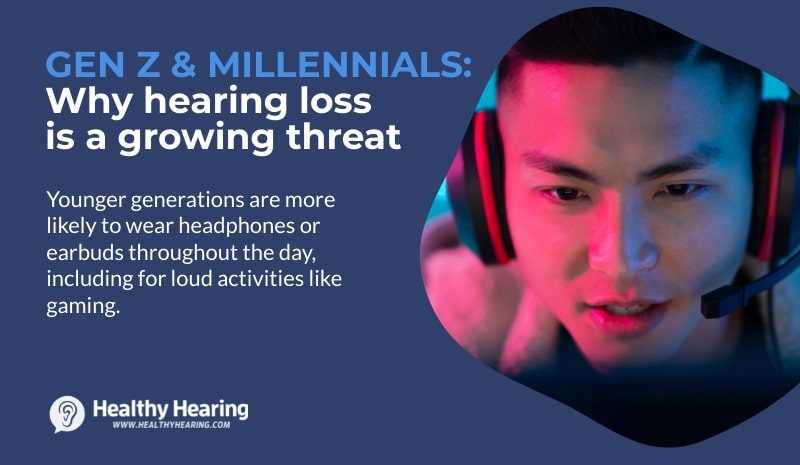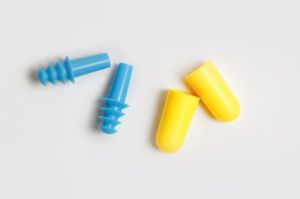Key points:
-
While hearing loss is more common in older adults, younger adults can experience it too.
-
Noise exposure is a leading cause of hearing loss for millennials and Gen Z.
-
This kind of hearing loss is permanent, making prevention important.
A common misconception about hearing loss is that it only happens to older adults. In reality, younger adults and teenagers can develop it, too.
In fact, due to smartphone audio streaming and more loud noise exposure, Gen Z and millennials are experiencing hearing loss at higher rates than previous generations were when they were the same age.
How many young adults have hearing loss?
The Centers for Disease Control and Prevention (CDC) reported that about 12% of adults ages 18-39 report difficulty following a conversation amid background noise, and about 6% experience ringing in the ears, known as tinnitus.
More recent research suggests that 17% of teenagers and 19% of people in their 20s (Gen Z) have signs of noise-induced hearing loss.

Noise exposure is the biggest culprit
While there are multiple factors that can cause hearing loss in young adults, exposure to loud noise remains the biggest risk. According to the World Health Organization (WHO), "over 1 billion young adults are at risk of permanent, avoidable hearing loss due to unsafe listening practices."
What is noise-induced hearing loss?
Noise-induced hearing loss is a permanent form of hearing damage caused by prolonged or sudden exposure to loud sounds. It can occur with exposure to sound over 85 decibels. The louder the noise, the less time it takes for the hair cells of your inner ear to become damaged.
Noise damage often occurs at work, especially in construction or manufacturing jobs. But recreational habits also pose a risk, such as:
- Using headphones or earbuds at high volume for a prolonged period
- Attending concerts, music festivals and nightclubs
- Recreational shooting and/or hunting
- Riding motorcycles, dirt bikes, ATVs or other motorsports
- Attending sporting events
- Watching fireworks
- Using power tools or lawn equipment
Why the increased risk in hearing problems for younger adults?
The amount of time young adults are exposed to loud noise has increased over the last 15 years, according to Dr. Cathy E. Kurth, AuD, director of audiology at Audiology of Scottsdale in Arizona. This is largely because of smartphones, gaming and other digital activities that have streaming sound.
Teens and young adults are wearing headphones and earbuds more frequently and for longer periods of time. It's become common to wear them almost all day—while commuting, studying, working out, talking on the phone, or playing video games at home.
Additionally, without monitoring, it can be hard to know just how loud the sound you are listening to is, which can make a big difference in the time it takes for damage to occur.
"Listening to sound at 80 decibels, or less, for up to eight hours is acceptable," said Dr. Kurth. "Listening to music that is 90 to greater than 100 decibels for over two hours can damage hearing permanently. As the decibel level increases with prolonged exposure, damage to hearing will occur sooner."
Gaming a rising hearing risk
Gaming, in particular, has been the focus of recent studies examining its potential risks to hearing. It's an incredibly popular hobby among young people, with a 2024 Pew Research Center survey noting that 85% of Gen Z report playing video games, with almost half saying they play daily.
A case study from BMJ Public Health found a correlation between playing video games or esports with hearing loss and tinnitus. They also noted that on average volume levels for gamers nearly exceeded or did exceed acceptable safe levels levels.
It’s common for gamers to play for hours at a time and to use headphones instead of device speakers—especially at gaming centers—where they may turn up the volume to drown out crowd noise. Many games also feature sudden, loud sounds such as explosions or gunshots. All of these factors can damage the ears.
Hearing loss impacts education, working, parenting
Life with hearing aids in your 20s, 30s and 40s can look remarkably different than having hearing aids in your older years.
Unlike most seniors, younger people are often in the midst of building careers, raising families, and pursuing education—all of which can be uniquely impacted by hearing loss.
When it comes to employment, things like deciding when or whether or not to disclose hearing loss or hearing aid use, navigating meetings (both in-person and virtual), and choosing a career path that is able to accommodate hearing needs are all real concerns. Meanwhile, people in college or graduate school may struggle to access the support they need and have to advocate for appropriate accommodations.
Raising infants and toddlers can pose challenges to any parent, but parents with hearing loss may need specialized baby monitors that flash, vibrate, or include video, and keeping hearing aids in peak condition becomes even more critical for safety and communication.
How can I protect my hearing?

with earplugs.
While not all hearing loss is preventable, you can absolutely take steps to protect yourself from noise-induced hearing loss by following certain rules when using headphones.
"If a person is using headphones or earbuds, they should listen at a maximum of 60 decibels for no longer than 60 minutes day," said Dr. Kurth.
If you have an iPhone, you can use the Apple Health app or download another decibel meter app to keep track of your decibel levels and get notifications when you are listening too loudly or have exceeded your exposure limit.
"Another important strategy is wearing earplugs while attending loud concerts and other loud venues," said Dr. Kurth. You can use store bought earplugs that can be found at pharmacies or online or you can get a pair custom made by a hearing specialist. If you don't like earplugs, noise-cancelling earmuffs are also available.
It's also important to take breaks from noise, especially if you noticing any ringing or pain in your ears or have a headache.
Other ways to keep your hearing healthy
While noise-induced hearing loss is the only type that’s fully preventable, living a healthy lifestyle can also support long-term hearing health. Eating well, exercising regularly, avoiding smoking, limiting alcohol, and managing medical conditions can all make a positive difference.
Find a hearing care provider near you
Protecting your hearing now can make a big difference later. If you’ve noticed ringing in your ears, trouble following conversations, or muffled sounds, it’s time to make an appointment for a hearing test with a hearing specialist near you.
Don’t let stigma or the idea that you’re “too young” for hearing aids hold you back. Today’s hearing aids are small, discreet, and packed with smart features that fit seamlessly into your lifestyle. Take control of your hearing health and improve your quality of life today.
The above is the interpretation of Hearing Loss in Young Adults: A Growing Problem provided by Chinese hearing aid supplier Shenrui Medical. Link https://www.srmcm.com/Blog/Hearing_Loss_in_Young_Adults_A_Growing_Problem.html of this article is welcome to share and forward. For more hearing aid related information, please visit Blog or take a look at our Hearing aids products















